If you test your pool water and have trouble holding free chlorine, you are not alone! This is an issue that many pool owners face that can be caused by a variety of factors. This article will explore 3 fixes when your pool won’t hold or keep free chlorine.
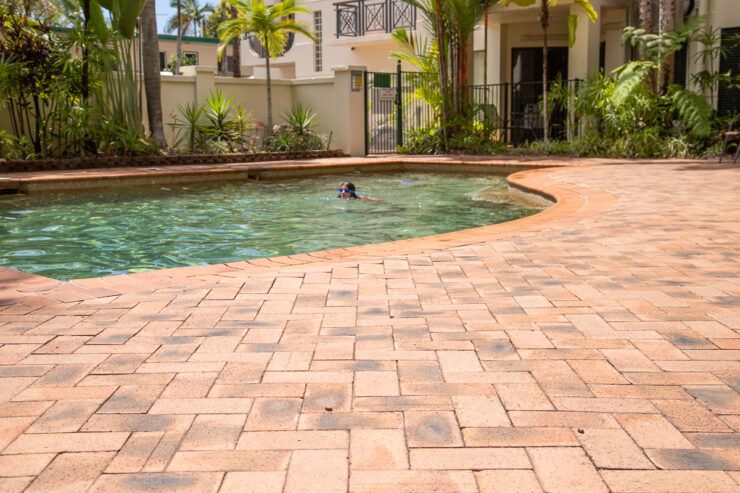
When your pool won’t hold or keep free chlorine, you can try shocking the pool with calcium hypochlorite, using a phosphate remover, or checking the cyanuric acid levels and adjusting them accordingly.
Article Contents
What it Means When Your Pool Won’t Hold or Keep Free Chlorine
If you have repeatedly added chlorine to your pool and, after testing, discovered that the levels of free chlorine are very low or have stayed the same, it is likely that you have a chlorine demand issue.
This occurs when the chlorine struggles to reach breakpoint chlorination. Chlorine is in high demand as it works harder and longer to reach the point where it can exceed the oxidant demand and have free chlorine available to sanitize the pool.
And now in English!
What’s happening is that you have a lot of contaminants in your pool water. From algae to plant matter such as leaves and petals to dead insects. These contaminants all “use” chlorine. And when you have a lot of them, then your chlorine may not keep up.
So the chlorine level keeps dropping. And you can’t get it to increase no matter how much chlorine you add to the water.
But these aren’t the only reasons your pool won’t hold chlorine…
5 Reasons Why Your Pool Won’t Hold Chlorine
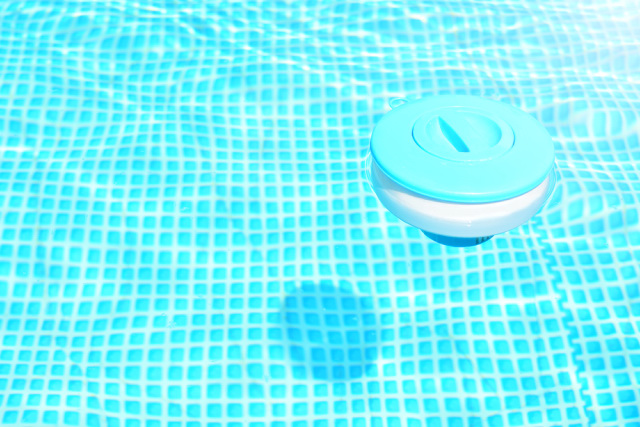
Here are some reasons why high chlorine demand may occur and prevent your chlorine or saltwater pool from holding chlorine.
1. Neglected Pool
If you have neglected your swimming pool for a long period of time there will be a build of debris and contaminants in the water, which will take a lot of chlorine to fix. You can start fixing the issue by skimming and vacuuming thoroughly and turning the filter on for an extended period (several days 24/7).
2. High Bather Load
Did you invite lots of people to your pool party last weekend? If you have a lot of people in your pool, it’s going to make chlorine’s job a lot harder to deal with all the sweat, sunscreen, skin cells, hair, food, drink, and possibly urine than it usually does.
In cases like this, adding lots of chlorine after your swimmers are finished is important.
3. Pool Contains Algae
Algae is a super common source of causing high chlorine demand in pools due to the algae feeding on all the phosphates in the pool water.
4. Warm Water Temperature
The warmer the pool water is, the more it can cause a drop in free chlorine levels. This can be due to the sun’s UV rays on an uncovered pool.
5. Water Out of Balance
If the water is out of balance, then it’s very likely your pool may not hold chlorine. Correct pH and stabilizer levels are essential to maintaining your pool.
Why Low or No Free Chlorine In a Pool Is a Problem
The main reason why having a low level or no free chlorine in your pool is problematic is that it is bad for your health. Not only that, it will affect the longevity of your pool and your ability to enjoy it!
In the table below, let’s look at the signs and risks of having a pool that won’t hold chlorine.
Signs and Risks of Having Low or No Free Chlorine in Your Pool
| Signs | Risks |
| Murky pool water that may appear brown or green | Swimming in too much chloramine can cause a person to become sick. Plus, it means the chlorine is “used up” and not effective. |
| A strong smell of “chlorine,” which is really chloramines (and not a sign of too much chlorine!) | Swimming in too much chloramine can cause a person to become sick. Plus, it means the chlorine is “used up” and ineffective. |
| That there are a lot of bacteria in the pool, and perhaps algae | This can cause health issues and make swimming in the pool less enjoyable |
| The walls of the pool may feel slimy | This can cause a person to slip and also get algae directly on their skin |
Swimming in a pool with low or no free chlorine is not recommended, so if your pool doesn’t keep free chlorine, ensure you get it fixed before going for a swim.
3 Ways To Fix a Pool That Won’t Hold or Keep Free Chlorine
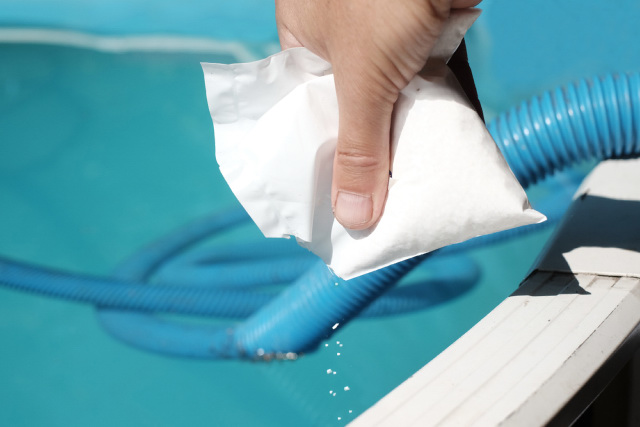
The 3 most effective ways to fix a pool that won’t hold or keep chlorine include:
- Shocking your pool with calcium hypochlorite or liquid chlorine
- Ensuring the water is balanced
- Using a phosphate remover
Let’s dive into each of them a bit deeper.
1. Shock Pool With Calcium Hypochlorite to Keep Free Chlorine
Using calcium hypochlorite to shock your pool when it doesn’t hold chlorine definitely makes number 1 on the list because it is:
- It’s extremely powerful and cost-effective
- Easy to get from any hardware store in person or online
- It stores well, generally for a few years
- Has a pH of around 11 pH making it easier to maintain your pool water at around 7.2 -7.6 pH compared to other products
- Is safer to handle than chlorine
- The calcium is less corrosive to your pool than other forms of chlorine
- It will act fast – let it do its thing overnight, then test the pool water in the morning.
Calcium hypochlorite, or “cal hypo,” is often bought in bags as white granules or tablet form. It is created from chlorine gas and calcium oxide. There is around 65% – 75% of chlorine in these commercial products, and for every 1 ppm of free chlorine, it supplies around 0.8 ppm of calcium.
You may need to shock your pool and maintain a high chlorine level (5 – 10 times the norm) for several days before your pool will hold chlorine again.
Be sure to clean your pool and balance the water before shocking it to make the shocking treatment as effective as possible.
2. Adjust the Water Balance to Help Pool Hold Chlorine
Cyanuric acid is a chlorine stabilizer, and it is on the list of ways to fix your pool when it doesn’t hold chlorine as it does:
- Affects chlorine strength
- If there is none or low levels of cyanuric acid in your pool or if there is too much, this can cause chlorine not to be effective
Test your cyanuric acid levels to know where you are, and make adjustments from there. 30 – 50 ppm is the recommended cyanuric acid level in your pool.
Cyanuric Acid Levels Too Low
Not having enough cyanuric acid, especially in outdoor pools exposed to the sun, will burn off chlorine and release it into the air. This means more chlorine is required to keep the free chlorine levels up. Placing a cover over the pool can be helpful to prevent this.
Cyanuric Acid Levels are Too High
Alternatively, it’s important to check that overstabilization hasn’t occurred. If cyanuric acid levels are too high, it reduces chlorine’s ability to sanitize the pool water.
pH Level Should be 7.4 – 7.6
Incorrect pH levels will cause the chlorine in your pool to not be as effective as it should be. The “killing” power of chlorine dramatically changes depending on the pH level of the water. The ideal pH level for swimming in swimming pools is 7.4 to 7.6.
When shocking your pool, you can increase the effectiveness of chlorine by bringing the pH down to 7.2.
Use muriatic acid or sodium bisulfate to lower the pool’s pH. Soda ash, baking soda, borates, and aeration will increase the pH.
3. Use a Phosphate Remover to Keep Free Chlorine in Your Pool
Using a phosphate remover can be a key fix to why your pool won’t hold chlorine. It has made the top 3 list of fixes:
- Phosphates can’t be oxidized and removed by chlorine (so you can’t shock it away)
- Easy to buy from any hardware store in person or online
- Only costs around $25 USD – $35 USD
- Has an indefinite shelf life
- Easy to use
Phosphates do not directly cause low free chlorine levels, but they can increase chlorine demand. This is due to phosphates promoting algae growth as algae feed off phosphates and continue contaminating the pool water.
If you find that shocking, the pool doesn’t work when you do have algae in the pool; this is because algae release phosphates back into the water as they break down!
What to Check When Your Saltwater Pool Won’t Hold Chlorine
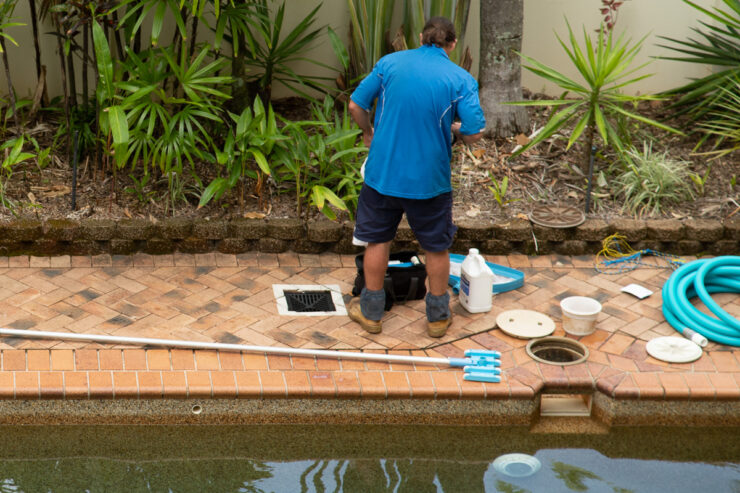
Don’t have a chlorine pool, but instead have a saltwater pool and are having trouble keeping the free chlorine levels up?
First, check all of the above things we discussed. If it’s not there, the saltwater chlorine generator may have issues with making or maintaining the chlorine.
It can be helpful to check the following:
- If there is a blown fuse or fault with the generator
- If you have enough salt in the pool
- If you are running the generator for a good amount of time (should be 8 hrs or so)
- The pool temperature isn’t too low (in cool temperatures, saltwater generators automatically decrease the chlorine production output)
- If there is a build-up of calcium in the salt cell
On another note, a saltwater pool is a great option to help you maintain chlorine levels if you struggle with looking after a chlorine pool that needs more work and maintenance.
3 Tips to Prevent High Chlorine Demand From Recurring
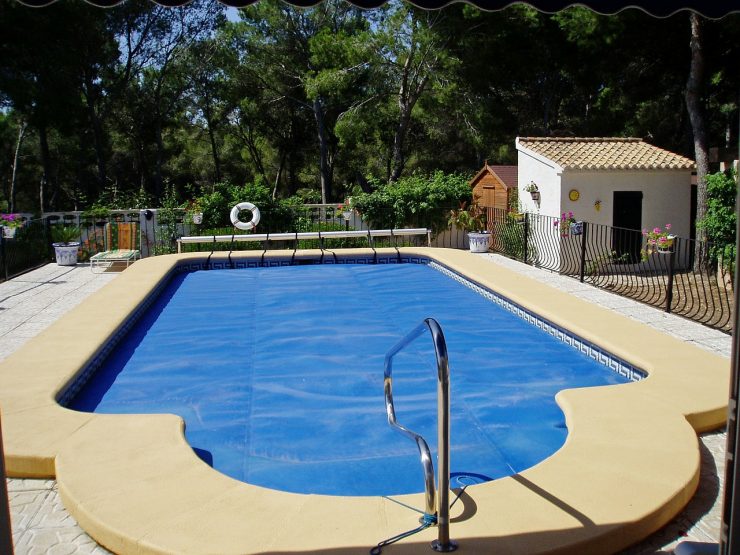
Here are some ways to ensure your pool does not reach the state where it has recurring issues of not holding or keeping free chlorine.
- Ensure your pool’s chlorine levels are always around 3 – 5 ppm – regularly add chlorine (twice a week or more) to achieve this.
- Monitor all chemical levels to maintain balance
- Cover your pool to keep the sun’s UV rays out and prevent debris from getting in the water
- Keep your pool clean (vacuum, skim, brush walls)
Overall, take care good of your pool, and if you have an above-ground pool that you are not going to use over the winter months, it can be a great idea to take it down.
Frequently Asked Questions
Can You Swim With No Free Chlorine in Your Pool?
No, it is recommended that you do not swim in a pool that contains no free chlorine, as this will be bad for your health.
Is It Important to Test the Amount of Free Chlorine in My Pool?
Yes, knowing how much free chlorine is in your pool will let you know if it is clean and healthy to swim in or not, so then you can make adjustments.
How Can I Test the Chlorine Levels in My Swimming Pool?
To test the chlorine levels in your pool water, you can use a liquid test kit or test strip.

